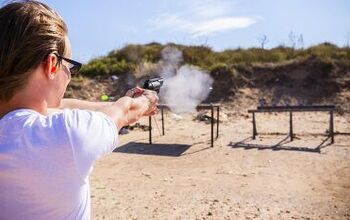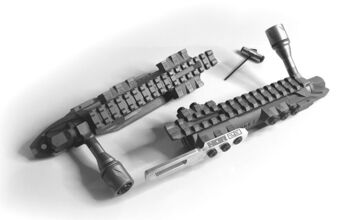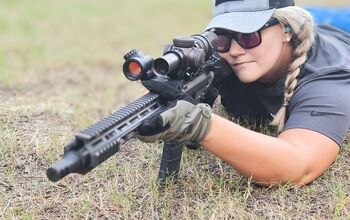The Rimfire Report: The "Gill Gun" - Springfield Model 87A .22 Rifle

Hello and welcome back to another edition of The Rimfire Report! This ongoing series is all about the rimfire firearm world and all of its different types of guns, shooting sports, ammunition, and history! Last week we took a look at CCI’s 22 CB 22-Shorts. These quiet little varmint-hunting cartridges were pretty popular centuries ago but today it seems that most people have adopted modern loads that can provide more power and better accuracy at more economical pricing. However, many of you in the comments noted that the Shorts are perfect for helping new shooters get acclimated to firearms, or great for some quiet and casual backyard plinking with something like a lever gun or single-shot rifle. This week we’re looking at a rifle that’s closer in age to the original 22 CB - the Savage/Stevens Model 87A also fondly known as a “Gill Gun.” Gill guns are a slightly broader category of firearm like you’ll see today, but we’ll primarily be focused on the Model 87A 22LR Semiautomatic rifle and its variants.
More Rimfire Report Articles @ TFB:
The Rimfire Report: The "Gill Gun" - Springfield's Model 87A .22 Rifle
The Model 87A or Gill Gun was first introduced in the late 1930s as a cost-effective and reliable small game hunting rifle. The rifle featured a 24-inch barrel capped with a simple bladed iron sight. Underneath the barrel was a long magazine tube that was capable of holding 15 rounds of standard 40-grain 22LR. The Model 87A also came standard with a wooden stock complete with included sling mounts. The rifle was produced by the Stevens Arms Company, which later became part of the Savage Arms Corporation and thus the Model 87A shares both the Stevens and Savages brand names.
What’s most interesting about this design is that the manufacturers of the day were already trying to combat the extremely dirty nature of rimfire cartridges as far back as the 1930s when the rifle was released. On the left-hand side of the receiver, the rifle featured a series of 90-degree vented ribs colloquially referred to as “Gills.” These gills, according to the original patent for the rifle, were meant to vent excess gas.
These gills, at least according to owners on various forums, did a great job of reducing the overall amount of fouling by not only allowing the unburnt powder to exit the receiver of the firearm on both sides but also blowing out any existing residue from the feeding area meaning that users could expect more reliable performance for longer. The rifle originally retailed for about $12 back during its initial release and for many users from the 40s and onwards - that would be the equivalent of about $260 today. The 87A was also available in a bolt-action variant.
Historical Performance and Unique Modern Applications
The Model 87A has a myriad of reports from across the world. The rifle was available at least in Australia, the UK, and the United States with most of the models being from the USA. Users often report that their rifles typically operate flawlessly with minimal maintenance, or tend to need a bit of work to get working properly. I think what it comes down to here is a combination of old design, and old worn-out parts, however, I’m inclined to believe that a properly maintained Stevens Model 87A would have operated just fine.
Some users have reported that the rifle is capable of going full-auto in some unique situations. It’s theoretically possible for the firing pin to get stuck protruding out of the bolt face if enough fouling is present. Another quirk that the rifle had was that could reliably feed (not cycle) 22 shorts and also tended to have the bolt hang back in the rearward position if the trigger was held down which gave it a unique cadence and led many to nickname the rifle “Click Clack” rifles. However, modern shooters probably aren’t all that worried about this particular feature, since the Stevens Model 87A also had another trick up its sleeve.
The 87A was capable of firing in a normal semi-automatic blowback operation, or single-shot mode with a locked breech. The bolt handle was capable of being pushed in to lock the bolt either to the rear or forward. This not only allowed for a safer way to carry the firearm or easier access to the chamber area for cleaning, but it also allowed the rifle to be fired with the bolt closed similar to a “hush puppy” mechanism. This has led many modern owners to thread their barrels for a much quieter experience when shooting with the breech locked.
Collector’s Status and Modern Pricing
The Savage/Stevens Model 87A is still a fairly common collector’s piece today. There are plenty available on gun auction sites like GunBroker.com. You can expect to pay about 1.5 times as much for one now with its inflation-adjusted price ($450). The rifles are arguably way more valuable in their unaltered state - early Model 87As were made before the 1968 requirement for manufacturer serialization so if you’re getting one through a transfer today - it probably has a serial number that was added after that date.
If you’re a lucky owner of one of these fun little rimfire guns, you’ll be happy to hear that spare parts are still available and being made for the Stevens Model 87A from the guys at Numrich Gun Parts. With new production parts, you should be able to keep your 87A going whether you’ve owned it for decades or just picked one up from your local gun store. Of course, I’d like to hear what you guys think about the Springfield Model 87A. This is another rimfire firearm I’ve yet to have the opportunity to shoot but I’d like to hear your experiences with the gun and any of its variants! Thanks as always for stopping by to read The Rimfire Report and we’ll see you all next week!

Reloader SCSA Competitor Certified Pilot Currently able to pass himself off as the second cousin twice removed of Joe Flanigan. Instagram: https://www.instagram.com/ballisticaviation/
More by Luke C.


























Comments
Join the conversation
Just picked up an 87a yesterday. Test fired about 20 rounds. Shoots great hitting 4”
metal at 50 yds no sight adjustment! Dad had one I learned to shoot as a kid. A brother inherited it. Glad to find one in excellent condition under 200$ !!!
I have one of these babies, I absolutely love it. It's been in the family for a long time, it was my dad's and before that, it was my grandpa's. Definitely one of my favorites of my collection. 😊